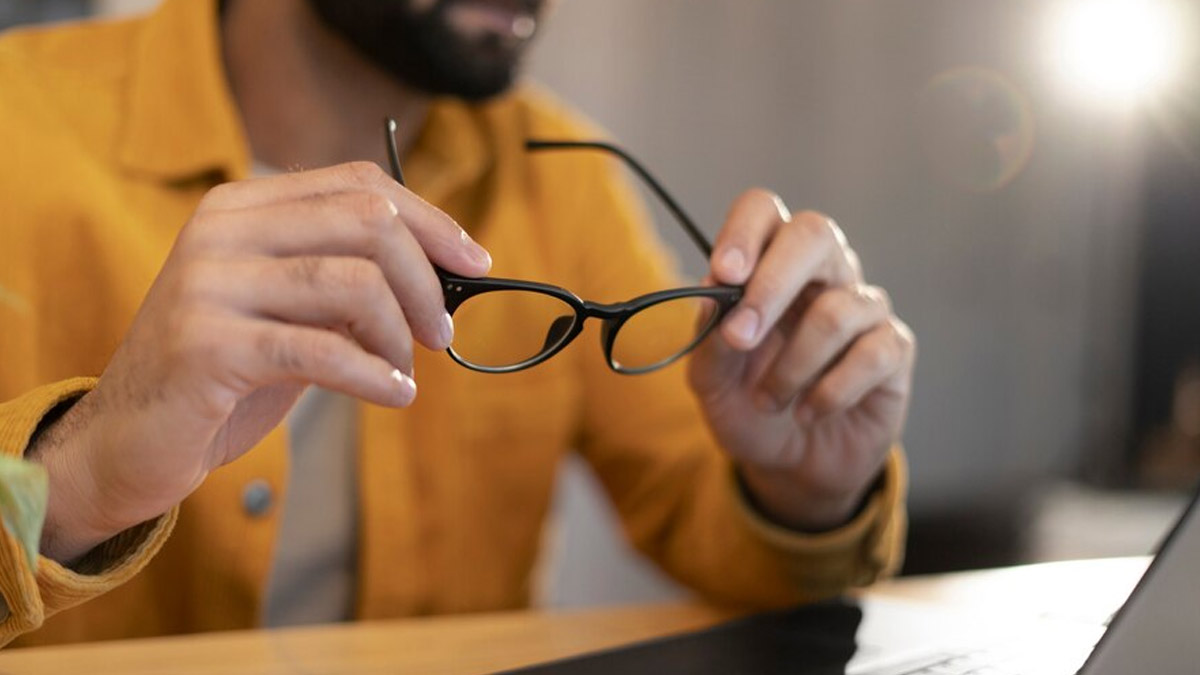
When we visit an optical store, there are a few things that we need to know beforehand. For instance, the accuracy of our prescription is key to obtaining the right lenses for our eyes. Then, we need to be sure of the frames that suit us and consider factors like our comfort and how long the eyewear will last. Another thing that an optician may push us into considering is blue light protection, which may cost a little extra.
Table of Content:-
So should you fall for it? Are blue-light glasses really helpful? Do they provide an extra layer of protection? Let’s find out...
Also Read: Eye-Twitching Goes Beyond Superstition: Here's What It Really Means
What Are Blue Light Glasses?

Blue light glasses are eyeglasses with lenses that are said to filter out blue light, which is emitted from digital screens like computers, smartphones, and tablets.
This type of light is thought to potentially disrupt sleep patterns and contribute to eye strain. Blue light glasses are said to help reduce symptoms like dry eyes, headaches, and blurred vision associated with extended screen time.
Do Blue Light Glasses Reduce Eye Strain?

Dr Anjal Shah, Consultant Ophthalmologist, Cataract and Refractive Surgeon, Dr Sachdev Maxivision Eye Hospital, Surat, says, "Blue light glasses have gained popularity as a remedy for screen-induced eye strain and sleep disruption. However, scientific evidence supporting their efficacy is mixed. While blue light from screens can disrupt sleep patterns, most devices emit minimal levels.”
In fact, a review published in the journal Ophthalmic and Physiological Optics looked at various studies where people wore these glasses and compared them to regular glasses.
The researchers found no strong evidence that these glasses improved vision, reduced eye strain, or helped people sleep better. They also didn't find any evidence that these glasses protected people's eyes from damage caused by light.
“Glasses with blue light filters may provide marginal relief for some individuals, particularly those prone to eye strain. Yet, they're not panaceas. Adjusting screen brightness, taking regular breaks, maintaining proper screen distance, and ensuring the monitor level is at eye level or below are equally crucial,” Dr Shah tells the OnlyMyHealth team.
He adds, “Consultation with an ophthalmologist can offer personalised advice. Ultimately, while blue light glasses may offer minor benefits, they're not essential for everyone and should be approached with moderation.”
Also Read: What Type Of Headache Is It If You Have Pain Behind Your Eye
Other Ways To Reduce Eye Strain

According to Dr Shah, there are various other strategies to reduce eye strain from prolonged screen time. These include:
- Practise the 20-20-20 rule: every 20 minutes, look at something 20 feet away for 20 seconds to relax eye muscles.
- Adjust screen brightness to match ambient lighting and minimise glare.
- Maintain an ergonomic setup with proper screen distance and posture, ensuring the monitor level is at eye level or below, and avoiding direct airflow from air conditioners, which may cause dry eyes.
- Blink frequently to keep your eyes moist, and use artificial tears if needed.
- Take regular breaks and engage in activities that don't involve screens.
- Ensure regular eye check-ups to address any underlying issues.
Conclusion
Blue-light glasses are filters that reduce the amount of blue light from digital screens, such as phones and televisions. They are often marketed as a protective filter against blue light rays, which are said to affect the eyes and cause strain. However, experts suggest that the research to back the claim is limited, and more studies need to be conducted to prove the same. Alternatively, you can reduce eye strain by limiting screen time and reducing the screen brightness. You can also consult an eye specialist to determine the best course of action for your eye health.
Also watch this video
How we keep this article up to date:
We work with experts and keep a close eye on the latest in health and wellness. Whenever there is a new research or helpful information, we update our articles with accurate and useful advice.
Current Version
